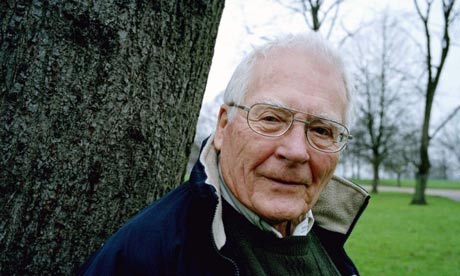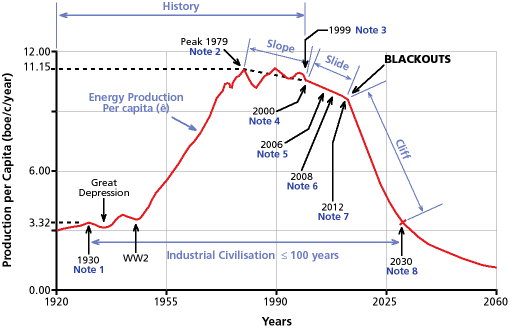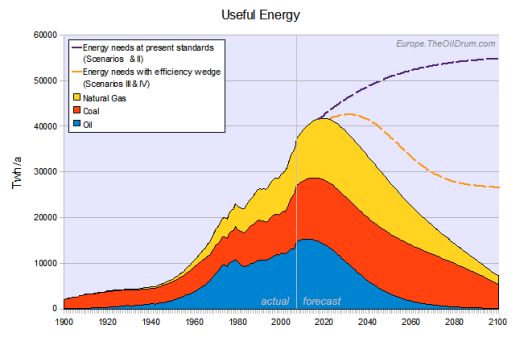The way the wind blows - towards Olduvai Gorge
Posted by Big Gav in james lovelock, olduvai gorge, wind power
Stuff.co.nz has a look at some of the issues surrounding the move towards 100% clean energy in New Zealand - "The way the wind blows".
As the Government moves to reduce New Zealand's greenhouse gas emissions, the public will be asked to make a tradeoff. Less fossil-fuel generation equals more dams, wind turbines and pylons.
In a valedictory appearance at the National Power Summit this week, outgoing Meridian Energy chief executive Keith Turner was in no doubt about the fundamental issue facing the electricity sector over the next decade. "The big issue in the next five to 10 years is how the New Zealand Energy Strategy is going to play out," he said. The centrepiece of the strategy, which was released by the Government late last year, is a target that at least 90 per cent of the country's electricity generation will come from renewable resources, such as wind, hydro and geothermal, by 2025. "These are lofty goals," Dr Turner said. "You can already see resources starting to mobilise toward them. But the biggest challenge will be the government response and how much teeth the Government gives it. It's one thing to say what we should do. It's another thing to give us the tools to enable us to do it."
At present, 68.5 per cent of New Zealand's 8900 megawatts of supply is generated from renewable resources.
Based on an estimate of a 20 per cent to 25 per cent increase in total electricity demand by 2025, Energy Minister David Parker reckons the country would need an extra 175MW of renewable supply a year to meet the target. A significant amount of this will come from geothermal projects around Taupo, and about 10 major wind farms and more hydro projects will probably be needed, he says. "We don't need to dam every river or put turbines on every ridge, though. History will show it'll be pretty easy." ...
A better-funded electricity grid will also be required to meet the 90 per cent target. A heavier reliance on an intermittent power source such as wind requires more capacity and a more technically advanced grid as more electricity needs to be moved around in times when the wind is not blowing. "Everybody in the world who is looking at significant wind is having problems with what sort of upgrades they need because they all recognise you have to have a grid with greater capability,'' says Transpower's general manager of grid investment, Tim George.
New wind farms and dams also need new transmission lines to connect to the grid. Genesis Energy chief executive Murray Jackson is cautious, though: "Every nook and cranny of New Zealand can't end up with a wind farm and a $300 million transmission line feeding into the national grid. We may want to zone different areas for wind.''
Genesis Energy chief executive Murray Jackson describes six or seven companies all helicoptering around New Zealand looking for different wind sites as scary. "Every nook and cranny of New Zealand can't end up with a wind farm and a $300 million transmission line feeding into the national grid,'' he says.
"We may want to zone different areas for wind.'' Zoning areas would make it a lot easier for Transpower to plan its grid investment, Mr George says. "The amount of wind is going to be limited by the cost of things we have to do to the grid. In my honest opinion, everyone is running around saying 'yes, we need a robust grid' and 'yes, we should develop it' but no one has thought it through carefully in terms of what it means and how we are going to get approvals for some of these issues.''
Most big electricity generators, and particularly those with strong renewable portfolios, seem to have bought into the 90 per cent target, but they are under no illusions as to the difficulty of getting consent for some of these plans. "It's ambitious but achievable,'' Mr Baldwin says. "But it goes well beyond the energy industry to achieve it.''
While Warren Buffett is something of a fan of wind power, and the Chinese are busy building 400 towers to do a detailed survey of their wind resources, apostle of doom James Lovelock says its all a waste of time, and the fe remaining breeding pairs of humans who forage a meagre existance in the Arctic next century will consider all this renewable energy stuff a complete waste of time.
In 1965 executives at Shell wanted to know what the world would look like in the year 2000. They consulted a range of experts, who speculated about fusion-powered hovercrafts and "all sorts of fanciful technological stuff". When the oil company asked the scientist James Lovelock, he predicted that the main problem in 2000 would be the environment. "It will be worsening then to such an extent that it will seriously affect their business," he said.
"And of course," Lovelock says, with a smile 43 years later, "that's almost exactly what's happened."
Lovelock has been dispensing predictions from his one-man laboratory in an old mill in Cornwall since the mid-1960s, the consistent accuracy of which have earned him a reputation as one of Britain's most respected - if maverick - independent scientists. Working alone since the age of 40, he invented a device that detected CFCs, which helped detect the growing hole in the ozone layer, and introduced the Gaia hypothesis, a revolutionary theory that the Earth is a self-regulating super-organism. Initially ridiculed by many scientists as new age nonsense, today that theory forms the basis of almost all climate science. ...
His latest book, The Revenge of Gaia, predicts that by 2020 extreme weather will be the norm, causing global devastation; that by 2040 much of Europe will be Saharan; and parts of London will be underwater. The most recent Intergovernmental Panel on Climate Change (IPCC) report deploys less dramatic language - but its calculations aren't a million miles away from his.
As with most people, my panic about climate change is equalled only by my confusion over what I ought to do about it. A meeting with Lovelock therefore feels a little like an audience with a prophet. Buried down a winding track through wild woodland, in an office full of books and papers and contraptions involving dials and wires, the 88-year-old presents his thoughts with a quiet, unshakable conviction that can be unnerving. More alarming even than his apocalyptic climate predictions is his utter certainty that almost everything we're trying to do about it is wrong.
On the day we meet, the Daily Mail has launched a campaign to rid Britain of plastic shopping bags. The initiative sits comfortably within the current canon of eco ideas, next to ethical consumption, carbon offsetting, recycling and so on - all of which are premised on the calculation that individual lifestyle adjustments can still save the planet. This is, Lovelock says, a deluded fantasy. Most of the things we have been told to do might make us feel better, but they won't make any difference. Global warming has passed the tipping point, and catastrophe is unstoppable.
"It's just too late for it," he says. "Perhaps if we'd gone along routes like that in 1967, it might have helped. But we don't have time. All these standard green things, like sustainable development, I think these are just words that mean nothing. I get an awful lot of people coming to me saying you can't say that, because it gives us nothing to do. I say on the contrary, it gives us an immense amount to do. Just not the kinds of things you want to do."
He dismisses eco ideas briskly, one by one. "Carbon offsetting? I wouldn't dream of it. It's just a joke. To pay money to plant trees, to think you're offsetting the carbon? You're probably making matters worse. You're far better off giving to the charity Cool Earth, which gives the money to the native peoples to not take down their forests."
Do he and his wife try to limit the number of flights they take? "No we don't. Because we can't." And recycling, he adds, is "almost certainly a waste of time and energy", while having a "green lifestyle" amounts to little more than "ostentatious grand gestures". He distrusts the notion of ethical consumption. "Because always, in the end, it turns out to be a scam ... or if it wasn't one in the beginning, it becomes one."
Somewhat unexpectedly, Lovelock concedes that the Mail's plastic bag campaign seems, "on the face of it, a good thing". But it transpires that this is largely a tactical response; he regards it as merely more rearrangement of Titanic deckchairs, "but I've learnt there's no point in causing a quarrel over everything". He saves his thunder for what he considers the emptiest false promise of all - renewable energy.
"You're never going to get enough energy from wind to run a society such as ours," he says. "Windmills! Oh no. No way of doing it. You can cover the whole country with the blasted things, millions of them. Waste of time."
This is all delivered with an air of benign wonder at the intractable stupidity of people. "I see it with everybody. People just want to go on doing what they're doing. They want business as usual. They say, 'Oh yes, there's going to be a problem up ahead,' but they don't want to change anything."
Lovelock believes global warming is now irreversible, and that nothing can prevent large parts of the planet becoming too hot to inhabit, or sinking underwater, resulting in mass migration, famine and epidemics. Britain is going to become a lifeboat for refugees from mainland Europe, so instead of wasting our time on wind turbines we need to start planning how to survive. To Lovelock, the logic is clear. The sustainability brigade are insane to think we can save ourselves by going back to nature; our only chance of survival will come not from less technology, but more.
TreeHugger reports that the Arctic ice cap may disappear completely this northern summer.
How low will they go? Putting a date on the melting of the Arctic ice cap has been a popular prediction game among scientists of late; in recent months, we've heard estimates ranging from 2030 to as early as 2013. The latest salvo comes courtesy of Xinhua, which reports that Olav Orheim, the head of the Norwegian International Polar Year Secretariat, is placing his money on this summer.
Noting that its ice sheet had reached a historical low of 3m sq. km last summer - it covered around 7.5m sq. km as recently as 2000 - Orheim told Xinhua that "if Norway's average temperature this year equals that in 2007, the ice cap in the Arctic will all melt away."
Barring this disaster, Orheim predicted that excess carbon dioxide emissions and higher average temperatures would unpredictably alter the region's fragile ecosystems. On a separate note, he said that Asia would likely be hardest hit by rising sea levels, estimating that a one meter rise would affect "nearly 100 million people on an area of 800,000 square km in Asia and direct economic loss will amount to 400 billion U.S. dollars."
The WSJ's Environmental Capital blog has a post on "mapping the wind" - an important topic for people in the real world who understand wind will likely be providing up to a quarter of our energy needs a century from now.

ust as the oil industry is turning to increasingly-sophisticated mapping techniques to find new oil fields, the renewable-energy industry hopes maps will chart its future. 3TIER, a Seattle-based firm, announced today what it calls the first global map of wind-power resources.
This first map is free to the public; later, more detailed maps and number-crunching will be for sale to the industry. The idea: Better information on exactly where, when, and how strong the the wind blows will help promote wind power, especially in developing parts of the world which haven’t been charted as meticulously as the U.S. or Europe.
Mapping wind resources isn’t quite the same as petroleum’s seismic imaging: 3TIER didn’t discover any hidden North Dakotas ripe for the picking. But getting the right data on wind itself is at the crux of wind power’s development. Many wind farm developers test wind for one or two years at a potential site; those early-stage projects make up the bulk of any wind developer’s “pipeline”. 3TIER’s models aim to reveal wind resources over a decades-long time frame.
“The fuel may be free, but all the money in the world won’t buy you more of it,” says Kenneth Westrick, 3TIER’s founder and chief executive and an atmospheric scientist.
Wind power’s limitations came to the fore during last week’s Texas brownouts, caused by a sudden cold front that killed the wind.That puts a premium on siting for wind farms. By building sophisticated models of a given area’s wind potential at different times, and with a host of climactic variables, Mr. Westrick hopes to be able to give wind farm developers more bang for their buck (and make some of his own.)
Finding the most consistently windy spots during dry weather, for instance, can show sites that will still produce electricity even when local hydroelectric power is down. That would make the electricity produced by wind power more valuable to wind farm owners and the utlities that buy the juice.
His next challenge? Getting the models to anticipate how climate change itself can disrupt wind patterns.
And finally, Luis de Sousa and Euan Mearns at TOD revisits the subject of Richard Duncan's "Olduvai Gorge" version of concentrated doomerism - a man who can give Lovelock a run for his money - "Olduvai Revisited 2008".









